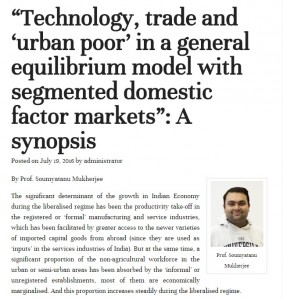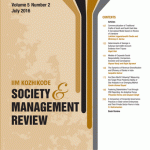PASCAL’S WAGER: A MEDIEVAL GOD VS. A MODERN GOD
By Prof. Kausik Gangopadhyay
Blaise Pascal, a gifted French mathematician and physicist of the seventeenth century, was an interesting character. Working on his own, Pascal discovered most of the Euclidean Geometry in his early adolescence. By his early teens, he invented a calculating machine—with no less than 20 prototypes called “Pascalines” made—to perform all four arithmetic operations. Unfortunately, prohibitively high making cost of that device impeded the commercial success of this venture, patented by Pascal. Far from being an exhaustive set of Pascal’s scientific endeavours, these are merely illustrative of Pascal’s all-compassing genius!
The other side of Pascal’s character was his deep religiosity. In fact, bidding science adieu he turned to metaphysical pursuits at an early age of 31. The remaining eight years, he dwelled on the Christian philosophy and lived a life of “Renunciation, total and sweet”. This is the time when he came up with a philosophical argument, now known as “Pascal’s Wager”, which is a gambler’s take on the basic question: “God is, or He is not”. Unsurprisingly, Pascal was an avid gambler for quite some time in his earlier life.
The gambler, like everyone, does not know the answer to this question. Nevertheless, he must go for one of the choices like in all gambles. And, what are the stakes involved? If you believe in God, you will enjoy heaven for eternity in your afterlife as a reward of your belief. If you do not believe in God, you will rot in hell for eternity. Of course, these are outcomes only if God is. If God is not then you may enjoy life (more) less by (not) believing; however this enjoyment is finite compared to the afterlife reward. Irrespective of the chance of God’s existence, it is a fair bet to believe in God. The possibility of infinite reward in believing is enough to outweigh the possibility of any finite reward in disbelieving.
Table 1
|
Believe
|
Disbelieve
|
|
|
God is
|
Infinite reward
|
Infinite punishment
|
|
God is not
|
Finite punishment
|
Finite reward
|
Pascal’s Wager: Payoffs in believing as opposed to disbelieving
However, the story changes if we think about neither a compassionate God nor a vengeful God but a human God, a playful God. Could it be humble mortals like you and I are still unsure of the existence of the Almighty God, the Supreme Being, in spite of His desire? Surely not! We infer that God does not like to reveal evidence of his existence to mortals. Let this be the primary goal of God. However, this God—may not be a deist god, a pantheist god or a panentheist god—does care about mortals believing in him otherwise he would have not entered in a game with a mortal altogether, let which be his secondary goal.
The humble mortal, let his be Blaise Pascal, is a rational being. He would not believe in God until backed by evidence. Having his self-pride in rationality is his primary goal. Though sceptic, he is no militant atheist. He definitely likes to believe which is actually his secondary goal. This is just to allow maximum possible chance to believing.
We frame this problem using tools of the game theory in the Table 2 below with two players of God and Blaise Pascal. The payoffs of both players are noted in the respective colours. (Without loss of generality, fulfilment of a primary goal is taken as 10 points and that of a secondary goal is one point.) If God reveals, the best strategy for Pascal is, obviously, to believe (fulfilment of both primary and secondary goals). If God does not reveal, the best strategy for Pascal is not to believe (fulfilment of primary goal as opposed to fulfilment of secondary goal). For God, on the same vein, the best strategy is not to reveal if Pascal is a believer (fulfilment of both primary and secondary goals); if Pascal is not a believer, still God’s best strategy is not to reveal (fulfilment of secondary goal as opposed to no goal). The equilibrium, technically called Nash equilibrium, happens when God’s best strategy meets Pascal’s best strategy. A rational Pascal, though looking forward to believe, is surely to disbelieve, and a human God, though like him to believe, will not reveal!
Table 2
|
Blaise Pascal
|
|||
|
Believe
|
Not believe
|
||
|
God
|
Reveal
|
10, 11
|
0, 0
|
|
Not reveal
|
11, 1
|
1, 10
|
|
In each of the four scenarios of Reveal-Believe, Not Reveal-Believe, Reveal-Not Believe and Not Reveal-Not Believe, the first number represents the payoff to God and the second number to Blaise Pascal.
I hope that at least some of my students have, by now, relished their end term question paper, a little more!
Source: 1. Against the Gods: The Remarkable Story of Risk, Peter L. Bernstein, Wiley (1998).
2. Game Theory and the Humanities: Bridging Two Worlds, Steven J. Brams, MIT Press (2011).
Kausik Gangopadhyay is an Assistant Professor of Economics at IIM Kozhikode

















 Users Today : 156
Users Today : 156 Users Yesterday : 457
Users Yesterday : 457 This Month : 14401
This Month : 14401 This Year : 14401
This Year : 14401 Total Users : 572645
Total Users : 572645 Who's Online : 4
Who's Online : 4